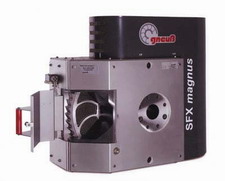The most commonly used material for the production of foamed panels is PS, and its polyolefins (such as LDPE), PET, and PVC. Foamed boards have good mechanical properties and insulation properties and are widely used in the fields of insulation, food packaging, fragile packaging, cushioning components, and exterior boards. More than 10 years ago, CFCs were generally used as blowing agents, but nowadays the most commonly used are butane, pentane or CO2; or additives are added at the time of board extrusion.

Gneuss Fully Automatic Filtration System SFXmagnus There are three basic processes for the production of general foamed boards, including the addition of chemical foaming agents and the injection of blowing agents as gases in single extruder/double extruders. Gneuss is specialized in producing the melt filtration system needed for the molding of such foamed sheet to remove soft and hard particles; maintaining even pressure to ensure that the honeycomb structure of the foamed sheet is uniform, etc.; Foaming during webbing; and preventing gas leakage during extrusion.
According to Gneuss company Andrew Prangnell, the melt filtration system has been successful in the field of foamed panels. The main reason for this is that the process and pressure are stable during operation, which results in a stable and consistent quality product. He stated that its filtration system has a high level of automation, and that there is no problem even with recycled materials with high levels of impurities. He stated that the advantages of the system lie in economy and safety: “Plastic foams use more gas blowing agents, and our products can effectively prevent gas leaks; in a fully controlled situation, the right amount of gas is injected evenly.â€
Gneuss' filtration system models include RSFgenius, SFXmagnus, SF and KSF. Andrew Prangnel suggested that the press manufacturer should select the appropriate model according to the desired function of the product; and all of the company's filters can basically produce stable foamed products, reduce the thickness tolerance to reduce waste, avoid the impact of the screen change process, and more. Heavy use of back feeds and safer changeover procedures.
Source: China Plastic Rubber

Gneuss Fully Automatic Filtration System SFXmagnus There are three basic processes for the production of general foamed boards, including the addition of chemical foaming agents and the injection of blowing agents as gases in single extruder/double extruders. Gneuss is specialized in producing the melt filtration system needed for the molding of such foamed sheet to remove soft and hard particles; maintaining even pressure to ensure that the honeycomb structure of the foamed sheet is uniform, etc.; Foaming during webbing; and preventing gas leakage during extrusion.
According to Gneuss company Andrew Prangnell, the melt filtration system has been successful in the field of foamed panels. The main reason for this is that the process and pressure are stable during operation, which results in a stable and consistent quality product. He stated that its filtration system has a high level of automation, and that there is no problem even with recycled materials with high levels of impurities. He stated that the advantages of the system lie in economy and safety: “Plastic foams use more gas blowing agents, and our products can effectively prevent gas leaks; in a fully controlled situation, the right amount of gas is injected evenly.â€
Gneuss' filtration system models include RSFgenius, SFXmagnus, SF and KSF. Andrew Prangnel suggested that the press manufacturer should select the appropriate model according to the desired function of the product; and all of the company's filters can basically produce stable foamed products, reduce the thickness tolerance to reduce waste, avoid the impact of the screen change process, and more. Heavy use of back feeds and safer changeover procedures.
Source: China Plastic Rubber